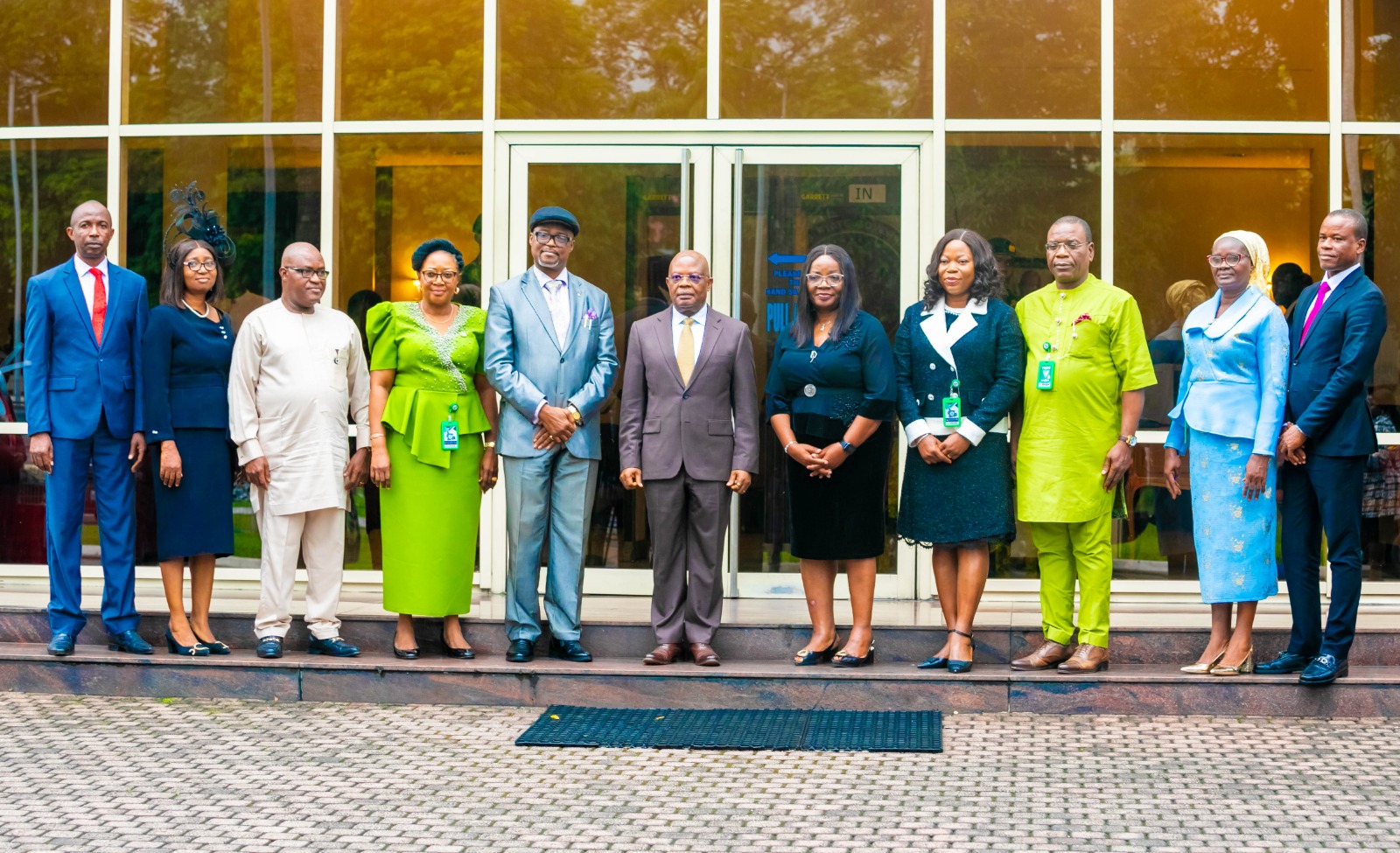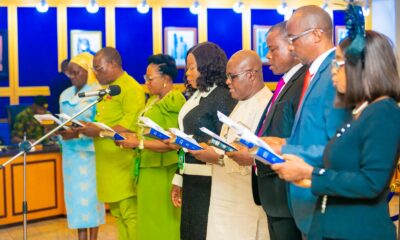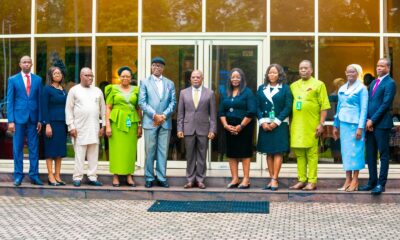Featured
N13.08trn Budget: 2nd Recession To Hit Economy Before Dec Ends -Buhari …N’Delta Amnesty Programme Gets N65bn

President Muhammadu Buhari, yesterday, predicted further hardship for Nigeria as he said the nation may face another recession before the end of the year, if serious and effective measures are not taken to ensure the nation’s financial security.
Buhari raised the alarm in his budget speech during the presentation of N13.08trillion budget for the 2021 fiscal year to a joint session of the National Assembly,.
He, however, vowed to pursue his administration’s goal of lifting 100million Nigerians out of poverty, even as he disclosed that the government has released N2.1trillion for capital projects in the 2020 budget.
President said about N3.85trillion has been earmarked for capital projects in the 2021 fiscal year, while the non-debt recurrent expenditure for next year would gulp N5.65trillion.
He said this was N1.15trillion higher than what was budget for capital in 2020.
The 2021 budget also has N100billion earmarked for Constituency projects of the lawmakers of both Chambers of the National Assembly, just as N128billion has been slated for statutory transfer to the National Assembly for payment of salaries and allowances next year.
This would, therefore, form part of the proposed N484.49billion transfers to other budget stakeholders.
A study of the 2021 budget breakdown as submitted by the President, indicated that the Ministery of Defense received the lion share of N840.56billion, followed by Ministry of Education, which received N545.10billion, while the Ministry of Health received N380.21billion in the 2021 Appropriation Bill.
According to the President, in line with the proposed borrowing plans to sustain the economy, the 2021 budget would operate at a deficit of N5.2trillion, just as N4.28trilion would be borrowed to finance the budget deficit.
The parameters and fiscal assumptions underpinning the 2021 appropriation, included: Benchmark oil price of $40 per barrel; daily oil production estimate of 1.86 million barrels (inclusive of Condensates of 300,000 to 400,000 barrels per day).
Exchange rate of N379 per $1; Gross Domestic Product growth projected at 3.0 per cent and inflation closing at 11.95 per cent.
The President said to maintain the peace in the Niger Delta region for economic and social activities to thrive, the provision of N65billion for the Presidential Amnesty Programme has been retained in the 2021 Budget.
“In addition, the sum of N63.51billion has been appropriated for the Niger Delta Development Commission (NDDC) and N24.27billion has been provided for the capital projects of the Ministry of Niger Delta Affairs. These allocations should further support the development of the region by facilitating the completion of important ongoing projects, such as the East-West Road”, he said
According to him, “Based on the foregoing fiscal assumptions and parameters, total federally distributable revenue is estimated at N8.433trillion in 2021. Total revenue available to fund the 2021 Federal Budget is estimated at N7.886trillion. This includes Grants and Aid of N354.85billion as well as the revenues of 60 Government-Owned Enterprises.
“Oil revenue is projected at N2.01trillion. Non-oil revenue is estimated at N1.49trillion. As you will observe, the format of the 2021 Appropriation Bill has been modified to include budgeted revenues, no matter how small, for each MDA, to focus on internal revenue generation. Accordingly, I implore you to pay as much attention to the revenue side as you do to the expenditure side.
“An aggregate expenditure of N13.08trillion is proposed for the Federal Government in 2021. This includes N1.35trillion spending by Government-Owned Enterprises and Grants and Aid funded expenditures of N354.85billion.
“For 2021, the proposed N13.08trillion expenditure comprises: Non-debt Recurrent Costs of N5.65trillion; Personnel Costs of N3.76trillion; Pensions, Gratuities and Retirees’ Benefits of N501.19billion; Overheads of N625.50billion; Debt Service of N3.124trillion; Statutory Transfers of N484.49billion; and Sinking Fund of N220billion (to retire certain maturing bonds).
“The 2021 Budget deficit (inclusive of Government Owned Enterprises and project-tied loans), is projected at N5.20trillion. This represents 3.64 percent of estimated GDP, slightly above the 3 percent threshold set by the Fiscal Responsibility Act, 2007. It is, however, to be noted that we still face the existential challenge of Coronavirus pandemic and its aftermath; I believe that this provides a justification to exceed the threshold as provided for by this law.
“The deficit will be financed mainly by new borrowings totalling N4.28trillion, N205.15billion from Privatization Proceeds and N709.69billion in draw-downs on multilateral and bilateral loans secured for specific projects and programmes.”
The sum of N484.49billion was provided in the budget proposal for Statutory Transfers representing an increase of N56.46billion (or 13 per cent) over the revised 2020 provision.
It includes: Niger Delta Development Commission (N63.51billion); North East Development Commission (N29.70billion); National Judicial Council (N110.00billion); Universal Basic Education Commission (N70.05billion); Independent National Electoral Commission (N40.00billion); National Assembly (N128.00billion); Public Complaints Commission (N5.20billion); Human Rights Commission (N3.00billion); and Basic Health Care Provision Fund (N35.03billion).
In the recurrent expenditures, the budget has N227.02billion for the Ministry of Interior; N441.39billion for the Ministry of Police Affairs; N545.10billion for Ministry of Education; N840.56billion for Ministry of Defence; and N380.21billion for Ministry of Health.
On debt servicing, Buhari said the Federal Government was committed to meeting its debt service obligations.
The budget provided N3.12trillion for this in 2021, representing an increase of N445.57billion from N2.68trillion in 2020.
He said a total of N2.183trillion has been set aside to service domestic debts, while N940.89billion has been provided for foreign debt service, just as N220billion is provided for transfers to the Sinking Fund to pay off maturing bonds issued to local contractors and creditors.
Speaking on overhead costs, the President said total overhead costs of MDAs and government owned enterprises are projected to rise to N625.50billion in 2021, mainly due to the inclusion of the overheads of an additional 50 government owned enterprises.
He added that overhead provisions have also been made for newly created agencies, urging MDAs to adhere to extant expenditure controls as a measure to keep a tab on running costs.
While indicating that an aggregate sum of N3.85trillion is expected to be available for capital projects in 2021, he gave the details as: N1.80trillion for MDAs’ capital expenditure; N745billion for Capital Supplementation; N355billion for Grants and Aid-funded projects; N20billion for the Family Homes Fund; N25billion for the Nigeria Youth Investment fund; N336billion for 60 Government Owned Enterprises; N247billion for capital component of Statutory Transfers; and N710billion for projects funded by Multilateral and Bilateral loans.
He said Capital expenditure in 2021 remains focused on the completion of as many ongoing projects as possible, rather than the commencement of new ones, adding “We have also made efforts to ensure equity in the distribution of projects and programmes in the proposed budget. I will be providing the National Assembly a list of some of the most critical projects which we must work collectively to ensure they receive adequate funding.
Highlights of the 2021 budget include: Power: N198billion (inclusive of N150billion for the Power Sector Recovery Plan); Works and Housing: N404billion; Transportation: N256billion; Defence: N121billion; Agriculture and Rural Development: N110billion; Water Resources: N153billion; Industry, Trade and Investment: N51billion; Education: N127billion; Universal Basic Education Commission: N70billion; Health: N132billion; Zonal Intervention Projects: N100billion; and Niger Delta Development Commission: N64billion.
According to the President, the sum of N420billion was also budgeted to sustain the Social Investment Programme, N20billion has also been set aside for the Family Homes Fund, Social Housing Programme. N75billion Survival Fund Programme to support and protect businesses from potential vulnerabilities. N100billion to households and small businesses; N100billion to the healthcare and pharmaceutical industry; and N1trillion to large agricultural and manufacturing businesses.
By: Nneka Amaechi-Nnadi, Abuja
Featured
Rivers A Strategic Hub for Nigeria’s Blue Economy -Ibas …Calls For Innovation-Driven Solutions

The Administrator of Rivers State, Vice Admiral (Rtd.) Ibok-Ete Ibas, has emphasized the need for innovation-driven strategies, strategic partnerships, and firm policy implementation to fully harness the vast potential of the blue economy.
Speaking during a courtesy visit by participants of Study Group 7 of the Executive Course 47 from the National Institute for Policy and Strategic Studies (NIPSS) at Government House, Port Harcourt, on Monday, Ibas highlighted the importance of diversifying Nigeria’s economy beyond oil by leveraging maritime resources to create jobs, enhance food security, strengthen climate resilience, and generate sustainable revenue.
The Administrator, according to a statement by his Senior Special Adviser on Media, Hector Igbikiowubo, noted that with coordinated efforts and innovative solutions, the blue economy could serve as a catalyst for inclusive growth, economic stability, and long-term environmental sustainability.
“It is estimated that a fully developed blue economy could generate over $296 million annually for Nigeria, spanning fisheries, shipping and logistics, marine tourism, offshore renewable energy, aquaculture, biotechnology, and coastal infrastructure,” he stated.
“We must transition from extractive practices to regenerative, inclusive, and innovation-driven solutions. This requires political cohesion, intergovernmental collaboration, robust infrastructure, and institutional capacity—all of which must be pursued with urgency and intentionality,” he added.
Ibas urged sub-national governments, particularly coastal states, to domesticate the national blue economy framework and develop tailored strategies that reflect their comparative advantages.
He stressed that such efforts must be guided by disciplined planning, regulation, and investment to maximize the sector’s potential.
Highlighting Rivers State’s pivotal role, the Administrator outlined its strategic advantages as follows:
•Nearly 30% of Nigeria’s total coastline (approximately 853km)
•Over 40% of Nigeria’s crude oil and gas output
•More than 33% of the country’s GDP and foreign exchange earnings
•416 of Nigeria’s 1,201 oil wells, many located in marine environments
•Two of Nigeria’s largest seaports, two oil refineries, and the Nigerian Liquefied Natural Gas (NLNG) terminal in Bonny Island—one of Africa’s most advanced gas facilities
Despite these opportunities, Ibas acknowledged challenges such as pollution, coastal erosion, illegal oil refining, unregulated fishing, inadequate infrastructure, and maritime insecurity.
He reaffirmed his administration’s commitment to institutional reforms, coastal zone management, and inter-agency collaboration to build a governance structure that supports a sustainable blue economy.
“Sustainability must be embedded in our development models from the outset, not as an afterthought. We are actively exploring partnerships in maritime education, aquaculture development, port modernization, and renewable ocean energy. We welcome knowledge-sharing engagements like this to refine our strategies and enhance implementation,” he said.
He urged the NIPSS delegation to ensure their findings translate into actionable recommendations that address the sector’s challenges.
Leader of the delegation, Vice Admiral A.A. Mustapha, explained that the visit aligns with their strategic institutional tour mandate on the 2025 theme: “Blue Economy and Sustainable Development in Nigeria: Issues, Challenges, and Opportunities.”
The group is engaging stakeholders to deepen understanding of policy efforts and institutional roles in advancing sustainable development through the blue economy.
Featured
INEC To Unveil New Party Registration Portal As Applications Hit 129

The Independent National Electoral Commission (INEC) has announced that it has now received a total of 129 applications from associations seeking registration as political parties.
The update was provided during the commission’s regular weekly meeting held in Abuja, yesterday.
According to a statement signed by the National Commissioner and Chairman of the Information and Voter Education Committee, Sam Olumekun, seven new applications were submitted within the past week, adding to the previous number.
“At its regular weekly meeting held today, Thursday 10th July 2025, the commission received a further update on additional requests from associations seeking registration as political parties.
“Since last week, seven more applications have been received, bringing the total number so far to 129. All the requests are being processed,” the commission stated.
The commission revealed the introduction of a new digital platform for political party registration. The platform is part of the Party Financial Reporting and Auditing System and aims to streamline the registration process.
Olumekun disclosed that final testing of the portal would be completed within the next week.
“INEC also plans to release comprehensive guidelines to help associations file their applications using the new system.
“Unlike the manual method used in previous registration, the Commission is introducing a political party registration portal, which is a module in our Party Financial Reporting and Auditing System.
“This will make the process faster and seamless. In the next week, the commission will conclude the final testing of the portal before deployment.
“Thereafter, the next step for associations that meet the requirements to proceed to the application stage will be announced. The commission will also issue guidelines to facilitate the filing of applications using the PFRAS,” the statement added.
In the meantime, the list of new associations that have submitted applications has been made available to the public on INEC’s website and other official platforms.
Featured
Tinubu Signs Four Tax Reform Bills Into Law …Says Nigeria Open For Business

President Bola Tinubu yesterday signed into law four tax reform bills aimed at transforming Nigeria’s fiscal and revenue framework.
The four bills include: the Nigeria Tax Bill, the Nigeria Tax Administration Bill, the Nigeria Revenue Service (Establishment) Bill, and the Joint Revenue Board (Establishment) Bill.
They were passed by the National Assembly after months of consultations with various interest groups and stakeholders.
The ceremony took place at the Presidential Villa, yesterday.
The ceremony was witnessed by the leadership of the National Assembly and some legislators, governors, ministers, and aides of the President.
The presidency had earlier stated that the laws would transform tax administration in the country, increase revenue generation, improve the business environment, and give a boost to domestic and foreign investments.
“When the new tax laws become operational, they are expected to significantly transform tax administration in the country, leading to increased revenue generation, improved business environment, and a boost in domestic and foreign investments,” Special Adviser to the President on Media, Bayo Onanuga said on Wednesday.
Before the signing of the four bills, President Tinubu had earlier yesterday, said the tax reform bills will reset Nigeria’s economic trajectory and simplify its complex fiscal landscape.
Announcing the development via his official X handle, yesterday, the President declared, “In a few hours, I will sign four landmark tax reform bills into law, ushering in a bold new era of economic governance in our country.”
Tinubu made a call to investors and citizens alike, saying, “Let the world know that Nigeria is open for business, and this time, everyone has a fair shot.”
He described the bills as not just technical adjustments but a direct intervention to ease burdens on struggling Nigerians.
“These reforms go beyond streamlining tax codes. They deliver the first major, pro-people tax cuts in a generation, targeted relief for low-income earners, small businesses, and families working hard to make ends meet,” Tinubu wrote.
According to the President, “They will unify our fragmented tax system, eliminate wasteful duplications, cut red tape, restore investor confidence, and entrench transparency and coordination at every level.”
He added that the long-standing burden of Nigeria’s tax structure had unfairly weighed down the vulnerable while enabling inefficiency.
The tax reforms, first introduced in October 2024, were part of Tinubu’s post-subsidy-removal recovery plan, aimed at expanding revenue without stifling productivity.
However, the bills faced turbulence at the National Assembly and amongst some state governors who rejected its passing in 2024.
At the NASS, the bills sparked heated debate, particularly around the revenue-sharing structure, which governors from the North opposed.
They warned that a shift toward derivation-based allocations, especially with VAT, could tilt fiscal balance in favour of southern states with stronger consumption bases.
After prolonged dialogue, the VAT rate remained at 7.5 per cent, and a new exemption was introduced to shield minimum wage earners from personal income tax.
By May 2025, the National Assembly passed the harmonised versions with broad support, driven in part by pressure from economic stakeholders and international observers who welcomed the clarity and efficiency the reforms promised.
In his tweet, Tinubu stressed that this is just the beginning of Nigeria’s tax evolution.
“We are laying the foundation for a tax regime that is fair, transparent, and fit for a modern, ambitious Nigeria.
“A tax regime that rewards enterprise, protects the vulnerable, and mobilises revenue without punishing productivity,” he stated.
He further acknowledged the contributions of the Presidential Fiscal Policy and Tax Reform Committee, the National Assembly, and Nigeria’s subnational governments.
The President added, “We are not just signing tax bills but rewriting the social contract.
“We are not there yet, but we are firmly on the road.”
-
Niger Delta6 hours ago
Adopt African System Against Crime, Don Urges Security Agencies
-
Rivers6 hours ago
Monarch Cautions Youths Against Illicit Drug Consumption
-
Opinion7 hours ago
Why Reduce Cut-Off Mark for C.O.E ?
-
News4 hours ago
Rivers Chief Judge Frees 21 Awaiting Trial Inmates
-
Politics6 hours ago
Alleged Money Laundering: Fayose Has No Case To Answer, Court Tells EFCC
-
Rivers6 hours ago
CDS Urges Communities To Protect Pipelines
-
Politics7 hours ago
Atiku’s Exit No Problem To PDP – Makinde
-
News4 hours ago
South-South contributes N34trn to Nigeria’s economy in 2024 – Institute










